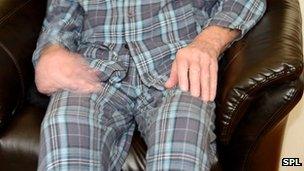Parkinson's sufferers 'face regular discrimination'
- Published

Nearly half of those with Parkinson's face regular discrimination, such as having their symptoms mistaken for drunkenness, a survey suggests.
The survey of more than 2,000 people was commissioned by charity Parkinson's UK.
One person in 500 people is affected by the condition in Britain.
Parkinson's sufferer Mark Worsfold was arrested during last year's Olympics because police thought he looked suspicious.
He was detained during the cycling road race in Leatherhead, Surrey, reportedly because he was not smiling - the condition means his face can appear expressionless.
Parkinson's is a progressive neurological condition that attacks the part of the brain that controls movement.
The main symptoms of Parkinson's are tremors or shaking that cannot be controlled, and rigidity of the muscles, which can make movement difficult and painful.
Public attitude
Speech, language and facial expressions can also be affected.
Most people who get it are aged 50 or over but younger people can have it too.
The survey found that one in five people living with Parkinson's had been mistaken for being drunk, while one in 10 had been verbally abused or experienced hostility in public because of their condition.
Around 62% said they thought the public had a poor understanding of how the condition affects people.
More than 37% of those surveyed said they felt isolated when in public and 60% said they felt uncomfortable or nervous.
Mark Worsfold, who has Parkinson's, was reportedly arrested because he was not smiling
But the research also revealed that discrimination did not just come from strangers.
Ten per cent said they had been treated badly while at work, and 30% said that friends treated them differently because they did not understand the condition.
The charity said the survey results painted a deeply disturbing picture about public attitudes towards those living with the degenerative disease.
'Hurtful comments'
Steve Ford, chief executive at Parkinson's UK, said: "Life with Parkinson's can be challenging enough, but when that is coupled with feeling scared to even go out in public for fear of freezing in a busy queue and being tutted or stared at, life can feel incredibly cruel.
"Time and again people with Parkinson's have to fight against the old stereotype that the condition is just a tremor.
"This basic misunderstanding has sentenced people with Parkinson's to a life of hurtful comments, being refused service in shops and even being shouted at in the street, all because people have mistaken their speech or movement problems - a common symptom of the condition - for drunkenness."
The charity is urging people to put themselves in the shoes of the 127,000 people in the UK living with the condition and learn more about Parkinson's.
- Published13 March 2013
- Published5 March 2013
- Published25 June 2012
- Published23 August 2011